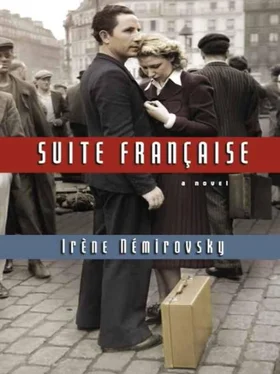Irène Némirovsky - Suite Française
Здесь есть возможность читать онлайн «Irène Némirovsky - Suite Française» весь текст электронной книги совершенно бесплатно (целиком полную версию без сокращений). В некоторых случаях можно слушать аудио, скачать через торрент в формате fb2 и присутствует краткое содержание. Жанр: Историческая проза, на английском языке. Описание произведения, (предисловие) а так же отзывы посетителей доступны на портале библиотеки ЛибКат.
- Название:Suite Française
- Автор:
- Жанр:
- Год:неизвестен
- ISBN:нет данных
- Рейтинг книги:4 / 5. Голосов: 1
-
Избранное:Добавить в избранное
- Отзывы:
-
Ваша оценка:
- 80
- 1
- 2
- 3
- 4
- 5
Suite Française: краткое содержание, описание и аннотация
Предлагаем к чтению аннотацию, описание, краткое содержание или предисловие (зависит от того, что написал сам автор книги «Suite Française»). Если вы не нашли необходимую информацию о книге — напишите в комментариях, мы постараемся отыскать её.
"A book of exceptional literary quality… it has the kind of intimacy found in the diary of Anne Frank."-The Times Literary Supplement
"Heroic… a novel about a nightmare in which the author is entirely embedded."-ANITA BROOKNER, The Spectator
"An exceptionally forceful and frank testimony… a real find. A masterpiece."-L'Express
"Remarkable as the story of the publication of Suite Française is, it will finally be of anecdotal interest compared with the importance of the book. Here is the work of a fine novelist at the top of her form, writing about the fate of her adopted country with a pitiless clarity."-Evening Standard
Suite Française — читать онлайн бесплатно полную книгу (весь текст) целиком
Ниже представлен текст книги, разбитый по страницам. Система сохранения места последней прочитанной страницы, позволяет с удобством читать онлайн бесплатно книгу «Suite Française», без необходимости каждый раз заново искать на чём Вы остановились. Поставьте закладку, и сможете в любой момент перейти на страницу, на которой закончили чтение.
Интервал:
Закладка:
"Very hard times, Madame," murmured Madame Angellier coldly. "We have a guest, as you know," she added, indicating the next room and smiling bitterly. "One of these gentlemen… You're putting someone up as well, no doubt?" she asked, even though she and everyone else knew that thanks to the Viscount's personal contacts there were no Germans at the château.
The Viscountess did not reply to this question, but said indignantly, "You will never guess what they have had the nerve to request… Access to the lake for fishing and swimming! And I, who love the water so much, will be forced to stay away all summer."
"Are they forbidding you to use the lake? Well, that's a bit much," exclaimed Madame Angellier, vaguely comforted by the humiliation inflicted upon the Viscountess.
"No, no," she insisted, "on the contrary, they behaved quite correctly. 'Please tell us when we may use the lake so we will not disturb you,' they said. But can you imagine me running into one of those men in my bathing suit? You know they even eat half naked? They take their meals in the courtyard of the school with bare chests and legs, and wearing a kind of jockstrap! The older girls' classroom looks out over the courtyard so they have to keep the shutters closed so the children don't see… what they shouldn't see. And you can imagine how pleasant that must be in this heat!"
She sighed: she was in a very difficult position. At the beginning of the war she had been passionately patriotic and anti-German, not that she particularly hated the Germans (she felt the same aversion, defiance and scorn towards all foreigners), but there was something wonderfully dramatic about patriotism and hatred of the Germans, as there was in anti-Semitism or, later, devotion to Maréchal Pétain, that sent chills down her spine. In 1939 she had organised a series of easy-to-follow lectures at the school on Hitler's psychology, which she had delivered to an audience of nuns, village gentlewomen and rich farmers' wives, and in which she had depicted all Germans, without exception, as madmen, sadists and criminals. Immediately after the defeat of France she had maintained this stance, mainly because it would have taken the kind of flexibility and sharpness of mind she clearly lacked to change camp so quickly. At the time, she herself had typed and distributed several dozen copies of the famous prophecies of Sainte Odile, who predicted the extermination of the Germans at the end of 1941.
But time had passed; the year had ended; the Germans were still here and, what's more, the Viscount had been appointed town Mayor, thus becoming a public official, forced to embrace the government's views. And so, with each day that passed, the Viscount leaned more and more towards what was called the policy of collaboration. As a result, Madame de Montfort found herself forced to water down her comments on current events. Now, once more, she remembered she mustn't show any ill will towards the conqueror and so said with tolerance (and anyway, Jesus wanted us to love our enemies, didn't he?), "I do understand they have to wear light clothing after their tiring exercises. After all, they're just like any other men."
But Madame Angellier refused to accept this argument. "They are dreadful creatures who hate us. They've said they won't be happy until they see all Frenchmen on their knees."
"It's abominable," said the Viscountess, sincerely indignant.
After all, the policy of collaboration had only been in existence for a few months, while hatred of the Germans was nearly a century old. Madame de Montmort instinctively reverted to speaking as she had in the past.
"Our poor country… laid bare, oppressed, ruined… And so many tragedies! Just look at the blacksmith's family: three sons, one killed, one a prisoner, the third missing at Mers-el-Kébir… And the Bérards from La Montagne," she said, adding the family's name to that of the farm where they lived, as was the custom in that part of the world, "since her husband was taken prisoner, the poor woman has gone mad from exhaustion and all her problems. The only people left to keep the farm going are her grandfather and a little thirteen-year-old girl. And as for the Cléments… the mother has died from overwork; her four children have been taken in by neighbours. Countless tragedies… poor France!"
Madame Angellier, her pale lips tightly closed, nodded her head in agreement and continued knitting. However, she and the Viscountess soon stopped talking about other people's disasters in order to discuss their own problems. There was a marked difference in the lively, passionate manner in which they now spoke, compared with the slow, exaggerated, polite way they had recalled their neighbours' misfortunes: it was the way a bored schoolboy would recite the death of Hippolytus seriously and respectfully, since it meant nothing at all to him, yet make his voice miraculously persuasive and impassioned when he stopped to complain to the teacher that someone had stolen his marbles.
"It's shameful, shameful," said Madame Angellier. "I pay twenty-seven francs for a pound of butter. Everything is sold through the black market. The townspeople have to get by, of course, but still…"
"Oh, don't remind me! I wonder how much food costs in Paris… It's fine for anyone with money, but," the Viscountess virtuously pointed out, "there are so many poor people, after all," and she enjoyed feeling she was a good person, demonstrating she hadn't forgotten the destitute; her pleasure was increased by knowing that thanks to her enormous fortune, she herself would never be in a position to be pitied. "People don't think about the poor enough," she said.
But all this was mere banter; it was time to come to the real point of her visit: she needed to get some grain for her chickens. Her poultry were famous in the region. In 1941 all wheat was requisitioned; it was, in theory, forbidden to give any to chickens. But "forbidden" didn't necessarily mean "impossible to get around," just "difficult to do"; it was simply a question of discretion, opportunity and money. The Viscountess had written a little article for the local newspaper, a right-thinking publication to which the local priest was a contributor. The article was called "Anything for the Maréchal!." This is how it started: "Let everyone remember! Let everyone continue to remind each other-gathered round your cottage hearths through the long evenings-any Frenchman worthy of the name will no longer give a single grain of wheat to his hens, not a single potato to his pigs; he will save his oats and rye, his barley and his rapeseed, and having gathered together all his riches, the fruits of his labour, watered with his own sweat, he will make a wreath of them, tie them up in a red, white and blue ribbon, a symbol of his patriotism, and lay them at the feet of the Venerable Elder who has restored our hope!" But of all the poultry yards where, according to the Viscountess, not a single grain of wheat should remain, her own was, naturally, the exception: it was her pride and joy, the object of her most attentive devotion; she raised rare breeds, prizewinners in the biggest agricultural competitions, both in France and abroad. The Viscountess's land was the very best in the region, but she wouldn't dream of going to her tenant farmers about such a sensitive transaction: it was unthinkable to give the working classes anything they could use against you; they would make you pay dearly for any such collusion. Madame Angellier, on the other hand… well, that was different. They could always come to some arrangement.
Madame Angellier sighed deeply. "I could perhaps… one or two bags… And you, Madame, perhaps you could arrange through the Mayor to get us a bit of coal? In theory, we shouldn't, but…"
Lucile left them and walked over to the window. The shutters were still open. The sitting room looked out on to the square. There was a bench opposite the War Memorial, in shadow. Everything seemed to be asleep. It was a wonderful spring night; silvery stars filled the sky. In the fading light you could just make out the rooftops of the neighbouring houses: the blacksmith's, where an old man was mourning his three lost sons; the small home of the shoemaker who had been killed in the war, and whose poor wife and sixteen-year-old son did their best to carry on. If you listened closely, thought Lucile, you might hear each of these low, dark, quiet houses moaning. But… what was that sound? From out of the darkness came laughter, the rustling of skirts. Then a man's voice, a foreign voice asked, "How you say that, in French? Kiss? Yes? Oh, it's nice…"
Читать дальшеИнтервал:
Закладка:
Похожие книги на «Suite Française»
Представляем Вашему вниманию похожие книги на «Suite Française» списком для выбора. Мы отобрали схожую по названию и смыслу литературу в надежде предоставить читателям больше вариантов отыскать новые, интересные, ещё непрочитанные произведения.
Обсуждение, отзывы о книге «Suite Française» и просто собственные мнения читателей. Оставьте ваши комментарии, напишите, что Вы думаете о произведении, его смысле или главных героях. Укажите что конкретно понравилось, а что нет, и почему Вы так считаете.

![Константин Бальмонт - Константин Бальмонт и поэзия французского языка/Konstantin Balmont et la poésie de langue française [билингва ru-fr]](/books/60875/konstantin-balmont-konstantin-balmont-i-poeziya-francuzskogo-yazyka-konstantin-balmont-et-thumb.webp)










